Mary Pipher, the Author Who Inspired ‘Barbie,’ Has Changed Her Mind About the Dolls
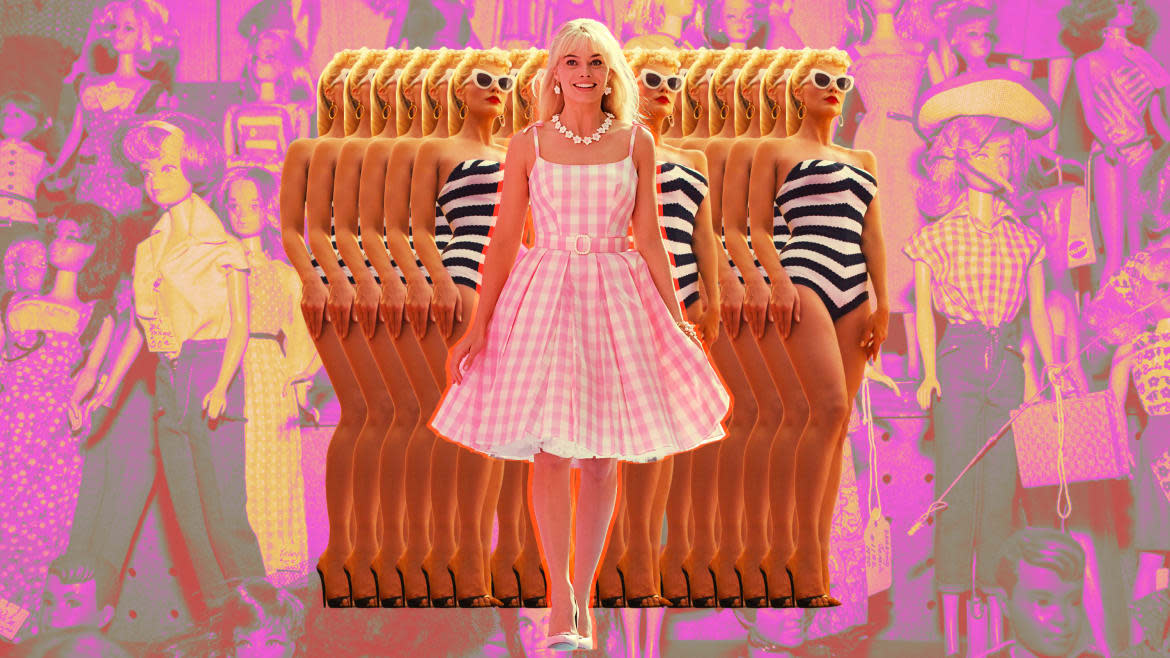
- Oops!Something went wrong.Please try again later.
- Oops!Something went wrong.Please try again later.
- Oops!Something went wrong.Please try again later.
Mary Pipher used to denounce Barbie dolls.
Barbies were exactly what Pipher—whose 1994 non-fiction book Reviving Ophelia inspired the plot of Barbie, according to director Greta Gerwig—strived to warn girls about in her writing. Girls shouldn’t need to have a figure like Barbie, she said, nor a perfectly symmetrical face or smooth blonde hair to be beautiful. “To totally accept the cultural definitions of femininity and conform to the pressures is to kill the self,” Pipher writes in her book. “Girls who do this are the ‘Muffys’ and ‘Barbie dolls’ with hair and smiles in place and a terrible deadness underneath.”
But through the eyes of Gerwig, Pipher tells me, Barbie becomes a “feminist icon.” No longer are Barbie dolls the antithesis of accepting one’s physical and emotional self. Barbie, as portrayed by Margot Robbie, goes through the same struggles as the young girls Pipher writes about in her book.
“[Barbie] is not the kind of movie I would usually go to, but I was glad I went,” Pipher tells The Daily Beast’s Obsessed on a phone call after having seen the blockbuster hit. “I was very touched by it. And I was touched by how interested [Gerwig] was in pursuing themes that are themes I pursued when I wrote Reviving Ophelia.”
A Coming-of-Age Movie That Doesn’t Sexualize Preteen Girls
In an interview with Vogue before the movie premiered, Gerwig revealed that Barbie’s character arc in the film was mostly based on Pipher’s exploration of young girls growing up. “They’re funny and brash and confident, and then they just—stop,” Gerwig said. “How is [Barbie’s] journey the same thing that a teenage girl feels? All of a sudden, she thinks, Oh, I’m not good enough.”
The book, which was re-released by Pipher and her daughter Sara Gilliam in 2019, details the struggles young girls face as they move out of childhood and into adulthood—particularly as a result of the way the media portrays women as they “ought” to be. Pipher shares anecdotes about young girls from her time as a clinical psychologist, during which she found girls came to her with problems regarding sex, body acceptance, grades, divorce, and more.
Pipher is glad to see an uptick in conversations surrounding her book today. “It’s just been fun for me,” she says. “And kind of surprising, now that I’m involved in a conversation about a Barbie movie after all these years.”
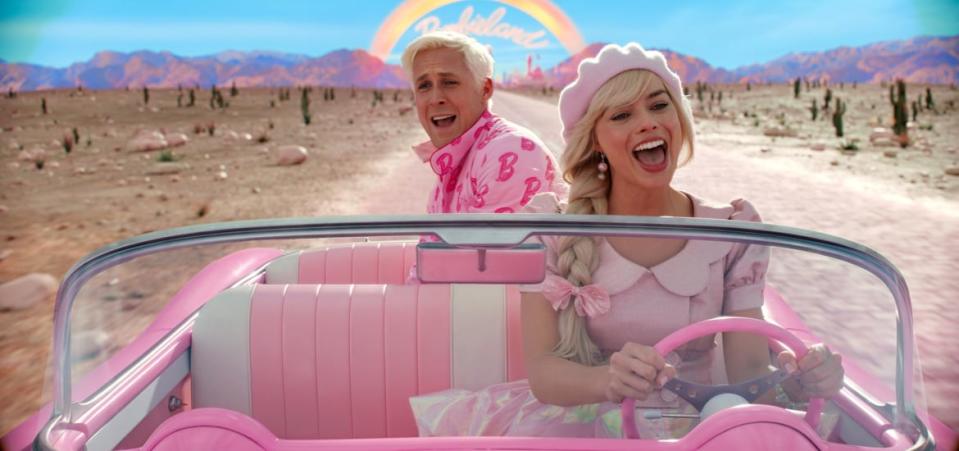
Ryan Gosling and Margot Robbie.
Below, Pipher analyzes Barbie’s message about our social media age, why the film is a faithful thematic adaptation of her work, and what she hopes viewers will take away from the feminist messages in the movie.
Let’s start with the basics. Did you enjoy Barbie?
It was really fun. I have a lot of respect for Greta. It’s a very rich movie in terms of the number of ideas that pop into your head as you watch. Just for one small example, the metaphor of Barbie being put into a box—that’s a very rich metaphor to think about, so I enjoyed it.
All Right, It’s Time for the Barbenheimer Memes to End Now
In what ways did you find that the movie connects to your book?
The movie follows very closely to the script of that book. For example, Ken [Ryan Gosling] waiting for the female gaze to feel alive. That’s absolutely something that’s in Reviving. [There’s also] the fear of not being perfect—and the whole business of false self versus true self and a search for authenticity that is rather an effort to please other people. It’s kind of a Pinocchio story in a way. It really has to do with going from being shallow to having a deep structure and some inner architecture.
But what I actually focused on when I saw it was the work I’ve done on social media and how social media cultivates the false self. Girls go from building their own sense of who they are to being in a “most likes” contest on social media. There’s all the artificial ways you can doctor your image to make sure you look like a Barbie. I really saw it as a way to discard the false social media self and become a true person.
You mentioned the idea of being put in a box as a metaphor in Barbie. No pun intended, but can you unpack that?
In Reviving, I talk about girls being so full of energy and intelligence and creativity and zest and opinions until they’re adolescents. And then they are figuratively put in a box. I grew up in the Midwest, and most of my friends are women who grew up in the Midwest. None of us can take a compliment. We just learned when we were young that if someone compliments our cooking, we always go, “Oh, I think there’s a little too much salt in it.” If someone compliments our appearance, we go, “Oh, this is just something I had in the closet for years.” Likewise, we’re always competing to sit in the back seat or do the dishes, because that’s how we learned to be as girls.
[That’s] the whole idea of being put in a box, where you’re quiet and well-behaved and non-assertive and helpful and pleasant and polite and especially never angry and never pushy. One way to think of being put in a box is the word “bitch.” Women do not want to be called a bitch. Another way that women can be put in a box is if they’re told, “You’re like your mother.”
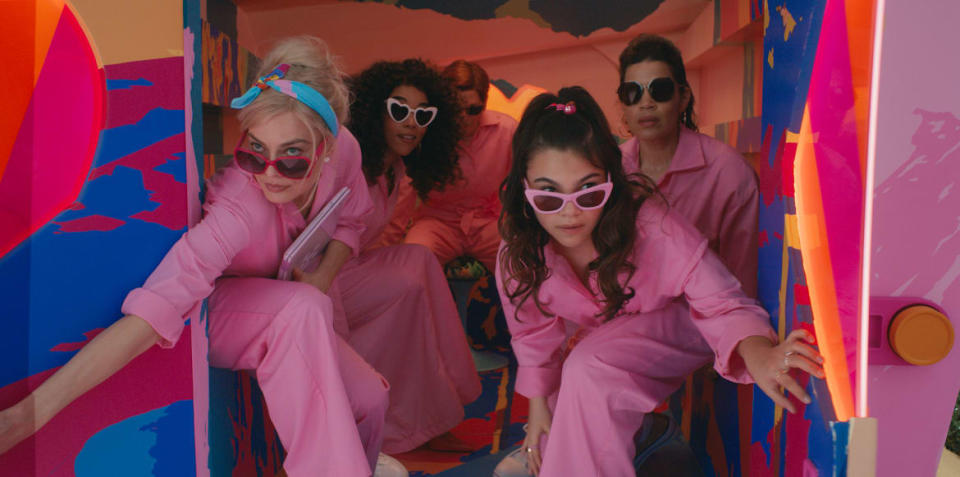
Margot Robbie, Alexandra Shipp, Michael Cera, Ariana Greenblatt, and America Ferrera.
America Ferrera, who plays Barbie’s human friend/owner Gloria, has a monologue near the end of the film that echoes a lot of what you’re saying. “You have to be a boss, but you can’t be mean.” Did you see that speech as something that aligned with Reviving Ophelia?
I actually looked through the book because there’s a place where I have a monologue too, that’s basically the same thing. But I talked about it with sexuality. “You’re supposed to be sexy and warm, but you’re not supposed to be too sexy, because then you’re a slut or promiscuous.” There’s a lot of messaging around how to be just the right amount of sexy.
Women are encouraged to be assertive, but not really. In fact, when women are more assertive—whether it’s in the workplace or often in their own families—they get in trouble. It’s a good thing to teach women to be assertive, but it’s also setting them up to take flack.
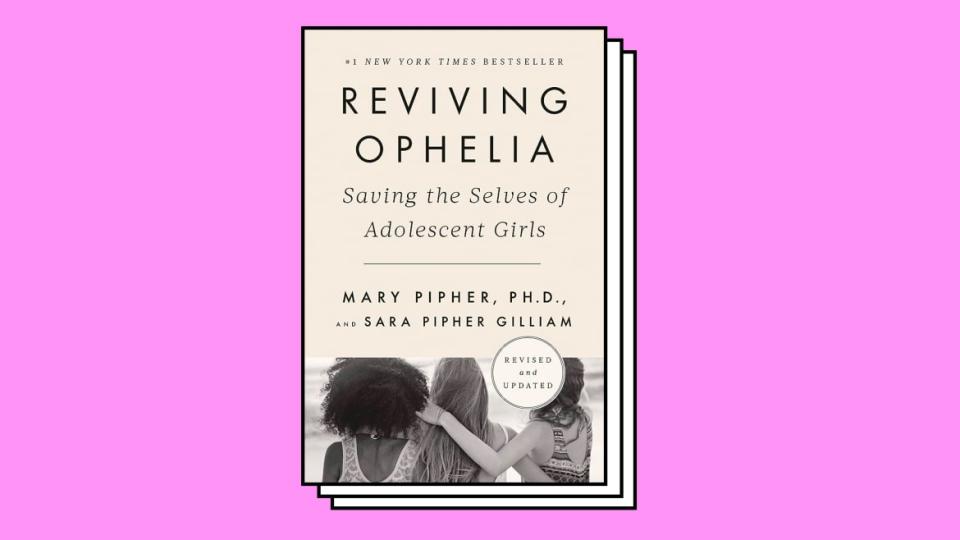
Gloria’s daughter, Sasha (Ariana Greenblatt), has a quieter moment in that same scene. Gloria apologizes for talking so much—but Sasha supports her, celebrating her mom’s speech.
That’s probably the best scene in the movie. What I was struck by, over the course of the arc of the daughter and the mother, was that they start out very distant from each other. In a way, that’s one of the goals of the culture, to separate mothers and daughters. [There’s] the whole idea that women don’t want to be like their mothers. They don’t give their dads a hard time—they give their moms a hard time.
The ‘Oppenheimer’ Sex Scenes Are Cringey, But Not Because of the Sex
How does that mother-daughter connection relate to what you were exploring in Reviving Ophelia?
I sold [Reviving Ophelia], and then about a week or so after, my mother had a heart attack and went into the hospital. I had to call my editor and say, “I can’t do this book. I’m working, I have children, and my mother's dying.” My editor was just wonderful, she said, “Call me after your mom dies.” So I spent a year helping my mom die and, of course, feeling very close to her. Then I started the book. As a tribute to my mom and based on my clinical work with all these girls, I decided to say nothing in the book that turned daughters against their mothers.
One thing that was really common later, when I gave speeches, was you’d see mothers bring their daughters to these big auditoriums. The daughters would be pissed off. They would pretend like they weren't with their mothers. But then at the end, they’d come up and they’d have their arms around each other. A mother and daughter would come up and say, “Before we read your book, we were fighting all the time. Now look at us.” That would just make me weep. I think that’s something that Greta really wanted to show too—that mothers and daughters are on the same side.
There’s another memorable quote about motherhood in the film, delivered by Rhea Perlman’s Ruth Handler, the creator of Barbie: “We mothers stand still so that our daughters can look back and see how far they’ve come.” What were your thoughts on that message?
Mothers don’t need to stand still. The idea that we enjoy watching our daughters blossom is a beautiful idea. But really, that quote actually feeds into the general idea that mothers are utterly self-sacrificing. One of the ways mothers can really be good role models for their daughters is to keep growing themselves, all of their lives, experiencing all kinds of new learning and interpersonal growth, emotional growth, spiritual growth. I probably wouldn’t have written that line quite that way if I’d been involved.
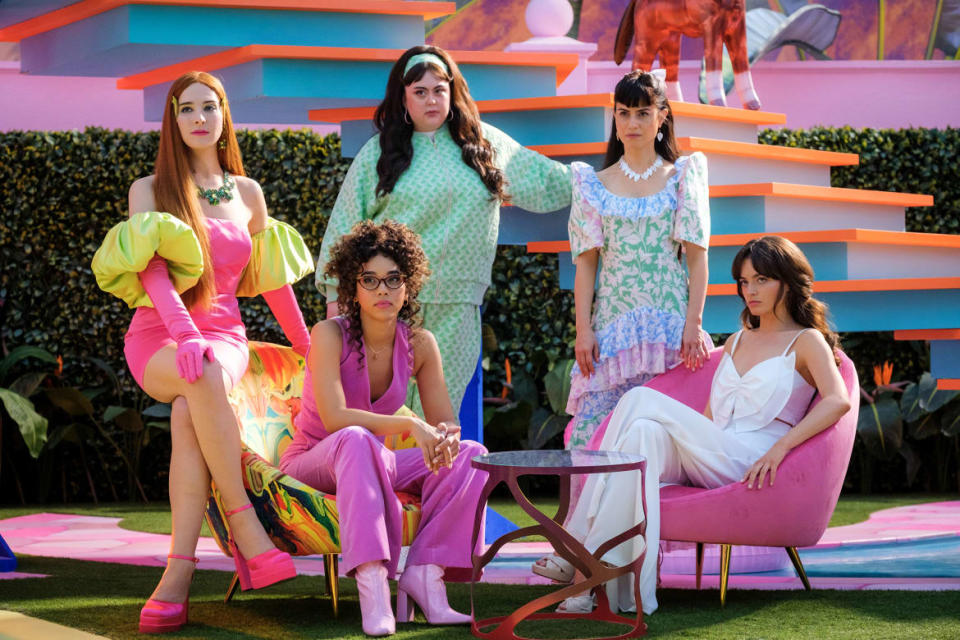
(L-R) Hari Nef, Alexandra Shipp, Sharon Rooney, Ana Cruz Kayne, and Emma Mackey as Barbies.
What did you think about the men in Barbie, from the Kens to the Mattel businessmen?
Men are in trouble too. I have a great deal of empathy for men. I’ve got grandsons and a son. The men in Barbieland all had trouble because they were arm candy. They were essentially playthings. Nobody likes to be a plaything. They were totally disempowered. The men in power in the boardroom, I thought that was really well done. It’s the business of men sitting around talking about female agency, or needing to put Barbie back in the box.
That was the essence of the problem with men—not that they’re mean or evil. It’s more on the level of just being clueless and not having the moral imagination to understand another person’s point of view. That lack of moral imagination is rampant in our culture right now, whether it’s about gender, LGBTQ+ [issues], race, so on. [When] they’re discussing female agency and wanting to run the show, it’s more about not realizing that the whole world doesn’t actually want them to run the show. We all want to be part of running the show.
That’s funny to hear, because some men have taken issue with Barbie’s take on gender roles. They never mind when they’re the evil villain, but they do mind when they’re portrayed as clueless.
Right! They don’t take issue with movies that portray them as serial killers. Isn’t that interesting? That’s another thing about the movie. The reason I think it’s such a cultural phenomenon is that there’s so few movies that actually tap into the issues that women are concerned about in their deepest thinking about themselves in the world. It’s a comedy, and there’s a lightness and playfulness [to it]. That makes the strong messages in it easier to absorb.
Director Greta Gerwig Responds to Right-Wing ‘Barbie’ Backlash
It’s a very rare movie. There are movies with women, gal-pal movies, or with women as objects of romance. But think of all the kinds of movies that are made for men. It’s so rare to have a movie that actually treats the female mind seriously.

Margot Robbie as Barbie.
What did you make of film’s final quip, when we see Barbie going to the gynecologist?
It was very surprising. To me, it signaled a couple of things. One is that, as a real person, you deal with your own sexuality. A fake Barbie doesn’t really have any sexuality. She presents herself as beautiful and desirable, but without desires herself. To have desires, you have to have a life and an awareness of your own body. In that sense, I thought she was signaling that she’s becoming real.
The other thing is that going to a gynecologist is uniquely women’s behavior. This is an experience that half the population has that men know nothing about. Generally, that is kept a secret in talks that women have at parties or when they’re with other women. But going to a gynecologist, for women, is much more of a coming-of-age moment than looking for a job, which is for both women and men.
What do you hope viewers take away from Barbie, especially in relation to how its messages align with those of your book?
I think that what I hoped [would happen] is actually what’s happening. It is generating a lot of discussions about women’s role in society and the fake self versus the real self. Is it important to be absolutely beautiful and perfect? Or is it possibly important to be real? I love that scene in the movie where Barbie goes, “Do you guys ever think about dying?” Because that’s real. That is a real conversation as opposed to, “Shall we have a dance party tonight?”
When I was coming of age as a 13 year old in Concordia, Kansas, those were the kind of conversations I was having with my friends. “What is death? What is God? What is our purpose in life? Who am I? How can I realize my potential?” [This] is the beginning of a series of really deep questions about who we truly are. And the men who see this movie, if they don’t go into it hostile and wanting to put it down, it’ll give men new insight and empathy for women.
I want to end on a slightly different note. Before the movie, what was your relationship with Barbie dolls?
My daughter didn’t want a Barbie doll. But I would never buy her a Barbie doll [anyway], because when I wrote Reviving Ophelia, the Barbie doll personified everything I didn’t like about the idea of a woman. I actually have a few critical remarks of Barbie in the original Reviving Ophelia. Since then, of course, Barbie has changed. If children like to play with Barbie dolls, that’s just fine with me, especially now that there’s a diverse group.
Barbie was really the epitome of what I didn’t want women to strive for. But on the other hand, it was also a change from the idea that women’s primary interest would be child raising. It isn’t a diss to be a mother. But this is to say: You can be a mother and have a profession. It’s good to have other options, besides being a mother, to strive for as an identity.
Barbie is putting women in a box, but in a certain sense, she also frees women.
I did think that scene where the girls smashed their baby dolls and picked up a Barbie was really interesting. Because the culture [at that time] was that girls were being raised to be mothers. All of a sudden, with Barbie, girls had another idea of what they could be.
Read more of our Barbie coverage HERE.
For One Lifelong Fan, ‘Barbie’ Had an Incredible, Unexpected Emotional Power
Was the ‘Barbie’ and ‘Oppenheimer’ Double Feature Worth It?
The ‘Barbie’ Movie’s Best Line Honors the Beauty of Older Women
Get the Daily Beast's biggest scoops and scandals delivered right to your inbox. Sign up now.
Stay informed and gain unlimited access to the Daily Beast's unmatched reporting. Subscribe now.

